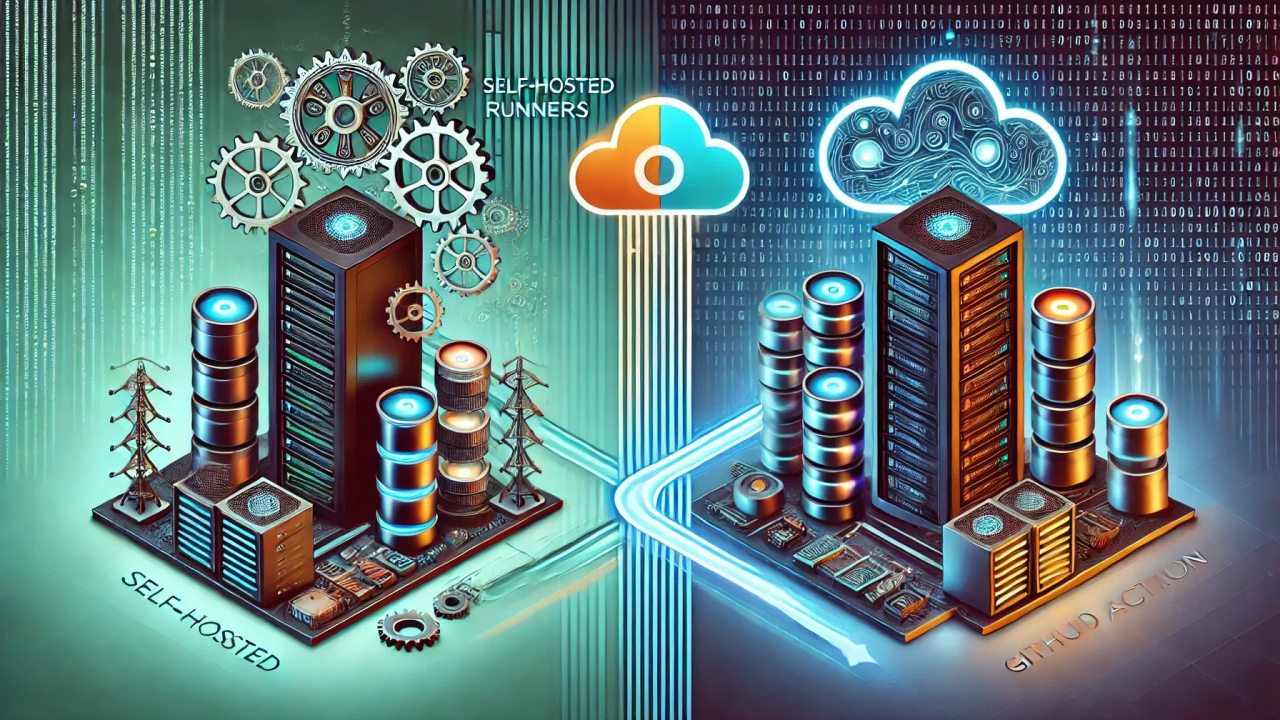Difference Between Self-Hosted Runner and GitHub Action Runner
 Mohammed Nadeem
Mohammed Nadeem
As a DevOps engineer, you're likely familiar with the importance of automation in streamlining your workflow. GitHub Actions provides a powerful toolset for automating your software delivery pipeline. However, when it comes to executing these actions, you have two primary options: Self-Hosted Runners and GitHub Action Runners. In this article, we'll delve into the differences between these two options to help you decide which one best suits your needs.
GitHub Action Runner
GitHub Action Runner is a managed environment provided by GitHub. It allows you to run your GitHub Actions workflows on a cloud-based infrastructure without the need to manage the underlying environment. With GitHub Action Runner, you can focus on defining your workflows, and GitHub will take care of the rest.
Benefits of GitHub Action Runner:
Easy Setup: GitHub Action Runner is straightforward to set up, with minimal configuration required.
Scalability: GitHub Action Runner automatically scales to meet the demands of your workflow, ensuring that your actions are executed promptly.
Security: GitHub manages the security and maintenance of the environment, reducing your administrative burden.
Reliability: GitHub Action Runner provides a reliable environment for your workflows, with built-in redundancy and failover capabilities.
Limitations of GitHub Action Runner:
Limited Control: With GitHub Action Runner, you have limited control over the underlying environment, which may not be suitable for workflows requiring specific configurations.
Cost: Depending on your usage, GitHub Action Runner may incur additional costs, especially for large-scale workflows.
Dependency Restrictions: GitHub Action Runner restricts the dependencies you can install, which may limit the flexibility of your workflows.
Self-Hosted Runner
A Self-Hosted Runner is an environment in which you manage and configure yourself to run your GitHub Actions workflows. It can be a physical machine, a virtual machine, or a containerized environment. With a Self-Hosted Runner, you have complete control over the environment and can customize it to meet the specific needs of your workflows.
Benefits of Self-Hosted Runner:
Customizability: Self-Hosted Runners offer unparalleled flexibility, enabling you to configure the environment to suit your workflow requirements.
Cost-Effective: Self-Hosted Runners can be more cost-effective, especially for large-scale workflows or organizations with existing infrastructure.
Security: By managing the environment yourself, you can implement custom security measures tailored to your organization's needs.
Dependency Flexibility: With a Self-Hosted Runner, you have complete control over the dependencies you can install, giving you greater flexibility in your workflows.
Limitations of Self-Hosted Runner:
Complex Setup: Setting up a Self-Hosted Runner requires more effort and technical expertise, especially for complex environments.
Maintenance Burden: With a Self-Hosted Runner, you're responsible for maintaining the environment, including updates, security patches, and troubleshooting.
Scalability Challenges: Self-hosted runners can be more challenging to scale, especially if you're managing a large number of runners.
Comparison summary
Conclusion
Choosing between a Self-Hosted Runner and a GitHub Action Runner depends on your specific needs and preferences. If you value ease of setup, scalability, and security, GitHub Action Runner might be the better choice. However, if you require customizability, cost-effectiveness, and control over the environment, a Self-Hosted Runner is likely a better fit.
As a DevOps engineer, understanding the differences between these two options can help you design and implement more efficient and effective software delivery pipelines.
Additional Resources:
GitHub Documentation: About self-hosted runners
GitHub Documentation: About GitHub-hosted runners
GitHub Blog: Introducing GitHub Action
I hope this expanded article meets your needs!!
Subscribe to my newsletter
Read articles from Mohammed Nadeem directly inside your inbox. Subscribe to the newsletter, and don't miss out.
Written by

Mohammed Nadeem
Mohammed Nadeem
Senior Cloud Engineer | Azure | Azure DevOps | Kubernetes | Docker | GitHub Actions | Terraform | Jenkins | Azure Certified


